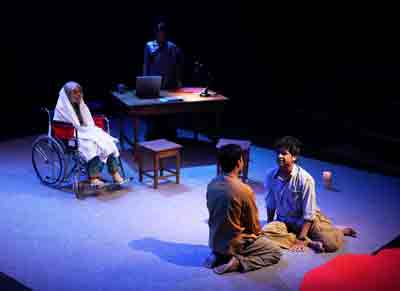Do you know Janusz Korczak?
Ravindra Tripathi’s
 A Scene from ‘Sunil Shanbaug’s Play ‘Dreams of Talim’
A Scene from ‘Sunil Shanbaug’s Play ‘Dreams of Talim’
Sometime you hear a true story which is more dramatic than drama, more painful than Greek tragedies. Here is a story for you which Sunil Shanbaug, the director who presented `Dreams of Talim’ in 13th BRM (Bharat Rang Mahotsav), told before a gathering in NSD on 14th of January. We met in `meet the director’ program in BRM. I was officially asked to conduct the program by Dinesh Khanna, the coordinator. The idea of the meet is a very good concept and well organized by Dinesh and his team members’ i.e. Suman Kumar Singh, Savita Rani, Vipin Bhardwaj and others. During the course of question-answer session, Sunil narrated a story which stunned the audience.
Replying to a question, Sunil said that this time (in 13th BRM) initially he wanted to bring another production based on Ravindra Nath Tagore’s Dak Ghar (the post office) in 13th BRM. But, regarding staging of Dak Ghar,there is another story attached to the play, the story of Janusz Korczak. Korczak was a polish writer of children literature during the Second World War. He was also a principal of a school for orphans. It was the time when Hitler’s German forces were encircling Poland. Himself a Jew, Korczak was at the receiving end of the Nazi German power, but he was continuing his work. He felt that something unexpected might happen any day and children of his orphanage should be prepared for this. At that horrible time of history, Korczak decided to do a play with orphan students and the name of the play was Dak Ghar. The play was staged. After sometime, the Nazis sent all the children to a concentration camp and they were massacred there. Korczak accompanied the children in graveyards.
In Sunil’s production of Dak Ghar this story is interwoven and it is already staged in Calcutta. The staging the Tagore’s play in those circumstances and story of Korczak’s integrity and commitment tells a lot about strength of literature. Korczak was himself a littérateur and wrote for children. But he chose Tagore’s play. Those who have either read or seen Dak Ghar know that it a story of hope and faith of a young and innocent boy. Perhaps Korczak thought that this play will be a moral source of strength at that time of darkness. Or maybe something else was in his mind. Who knows? But one thing is certain that literature, drama or art has a moral relevance.
I am eager to see this production of Sunil.